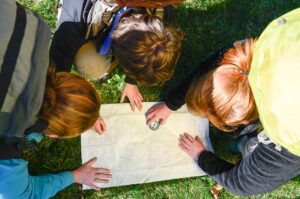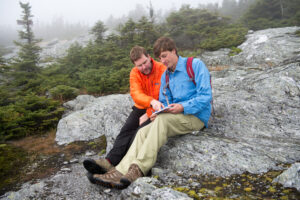 A question we often hear from families and students alike is, “How is fire making, building traps and hiking possibly going to help me in my life?!” As professionals working in the field of wilderness therapy, we have long seen how a few short intensive months in wilderness settings can have a positive impact on a student’s success in academic endeavors. However, understanding what actually goes on in wilderness to translate that success to the outside world—specifically in school and academic domains—can be perplexing to those not accustomed to walking through the woods for their commute to work. Emotional intelligence, self-efficacy, effective communication and self-advocacy are key elements to helping students find effectiveness in the classroom and the wilderness milieu is particularly well suited at promoting advancement of these developmental skills.
A question we often hear from families and students alike is, “How is fire making, building traps and hiking possibly going to help me in my life?!” As professionals working in the field of wilderness therapy, we have long seen how a few short intensive months in wilderness settings can have a positive impact on a student’s success in academic endeavors. However, understanding what actually goes on in wilderness to translate that success to the outside world—specifically in school and academic domains—can be perplexing to those not accustomed to walking through the woods for their commute to work. Emotional intelligence, self-efficacy, effective communication and self-advocacy are key elements to helping students find effectiveness in the classroom and the wilderness milieu is particularly well suited at promoting advancement of these developmental skills.
 As wilderness therapists, we have taken what was once an experimental exercise to new levels of clinical sophistication that is increasingly becoming more grounded in research and empirical validation. Academic emotions such as pride, hope, relief, anger, anxiety, shame, hopelessness, and boredom have been increasingly found to be significantly related to students’ motivation, use of effective learning strategies, ability to access cognitive resources, ability to self-regulate, and overall academic achievement (Pekrun, et.al., 2010; Pekrun, et.al., 2017). As a whole, we have learned that without addressing underlying social, emotional and behavioral concerns, it can be difficult for adolescents and young adults to function effectively in their relationships or academic endeavors. The wilderness milieu is adept at emulating the challenges of the school environment and, as a result, these underlying emotions can be assessed and addressed in an open, transparent and effective way.
As wilderness therapists, we have taken what was once an experimental exercise to new levels of clinical sophistication that is increasingly becoming more grounded in research and empirical validation. Academic emotions such as pride, hope, relief, anger, anxiety, shame, hopelessness, and boredom have been increasingly found to be significantly related to students’ motivation, use of effective learning strategies, ability to access cognitive resources, ability to self-regulate, and overall academic achievement (Pekrun, et.al., 2010; Pekrun, et.al., 2017). As a whole, we have learned that without addressing underlying social, emotional and behavioral concerns, it can be difficult for adolescents and young adults to function effectively in their relationships or academic endeavors. The wilderness milieu is adept at emulating the challenges of the school environment and, as a result, these underlying emotions can be assessed and addressed in an open, transparent and effective way.

In particular, self-efficacy, or an individual’s belief in his or her ability to execute specific performance attainments (Bandura, 1977), has been shown through researchto be a strong predictor of students’ motivation and learning (Zimmerman, 2000). As students experience adversity and new challenges when living in wilderness settings, it challenges their sense of self-efficacy in a constructive and growth-oriented way. It is through this growth that students learn how to develop an increased sense of resilience, self-efficacy and self-regulation that can be translated to future applied motivation and success in the classroom.
Research has also indicated that that healthy emotional communication and expression in parent–child relationships is significantly associated with children’s school success (A. Moed, et. al., 2017). In our parent program, families come to understand their own patterns of engagement and learn new methods and modes of communication to support learning, social, emotional and relational needs. As students engage in True North Wilderness Program expectations and assignments, they come to understand how their own unhealthy patterns have contributed to discord in family and academic life. Through this understanding and through utilizing letter writing, curriculum assignments, and family workshops, we can affect not only family patterns, but also awareness of how parents can support children in their continued life and academic endeavors.
 One final thematic note is the concept of self-advocacy. When students who come to True North have struggled in school, the reason for this struggle often goes beyond simple avoidance or academic difficulty. The school avoidance or struggle that students often present with is not necessarily because school itself is a challenge, but often happens because they lack the confidence to ask for help or may be unsure of how to advocate for their specific learning needs. As a result, students fall behind and feel unable to crawl out from the mounting loads of work and feelings of self-doubt that creep up in response to school stressors. At True North, we address these concerns head on by helping students to learn effective self-advocacy techniques. We also help students to better understand how learning and executive functioning needs interfere with learning success, while also helping them to find confidence, rather than shame, in advocating for scaffolding supports.
One final thematic note is the concept of self-advocacy. When students who come to True North have struggled in school, the reason for this struggle often goes beyond simple avoidance or academic difficulty. The school avoidance or struggle that students often present with is not necessarily because school itself is a challenge, but often happens because they lack the confidence to ask for help or may be unsure of how to advocate for their specific learning needs. As a result, students fall behind and feel unable to crawl out from the mounting loads of work and feelings of self-doubt that creep up in response to school stressors. At True North, we address these concerns head on by helping students to learn effective self-advocacy techniques. We also help students to better understand how learning and executive functioning needs interfere with learning success, while also helping them to find confidence, rather than shame, in advocating for scaffolding supports.
In our work in the field of wilderness therapy, we are aiming to bring greater understanding to how scaffolding, explicit education on communication strategies, peer feedback, role modeling, metaphor and self-advocacy impact student empowerment, strategy retention and ultimate success in academic endeavors. Here at True North Wilderness Program, we utilize a strength-based, person centered and individualized methodology to assess and address issues related to executive functioning deficits, identity development, relational awareness, building resilience, and developing intrinsic motivation. We also take a creative and empirically informed approach to understanding what underlying social or emotional concerns can have an impact on relationship success and school performance. As we continue to pursue specific research projects to demonstrate how making fires, building traps and hiking will lead to these positive outcomes, our aim is to offer an experience that enables families to see the impact with their own eyes.
 **This blog post includes content from a professional presentation given at the IECA (Independent Educational Consultants Association) Conference in Washington, DC, November 15, 2017, by Evan Oppenheimer, LMHC and Krissy Naspo, MA
**This blog post includes content from a professional presentation given at the IECA (Independent Educational Consultants Association) Conference in Washington, DC, November 15, 2017, by Evan Oppenheimer, LMHC and Krissy Naspo, MA
References
Bandura, A. (1977). Self-efficacy: Toward a unifying theory of behavior change, Psychological Review, 84, pp. 191-215
Moed, A., Gershoff, E., Eisenberg, N., Hofer, C., Losoya, S., Spinrad, T., & Liew, J. (2017). Parent–child negative emotion reciprocity and children’s school success: An emotion-attention process model, Social Development, 26 (3), pp. 560–574, DOI: 10.1111/sode.12217
Pekrun, R., Goetz, T., Titz, W. & Perry, R. (2002). Academic emotions in students’ self-regulated learning and achievement: A program of qualitative and quantitative research. Educational Psychologist 37 (2). DOI: doi.org/10.1207/S15326985EP3702_4
Pekrun, R., Lichtenfeld, S., Marsh, H.W., Murayama, K. & Goetz, T. (2017). Achievement emotions and academic performance: Longitudinal models of reciprocal effects. Child Development, 88 (5), pp. 1653–1670, DOI: 10.1111/cdev.12704
Zimmerman, B. (2000). Self-efficacy: An essential motive to learn, Contemporary Educational Psychology, 25 (1), pp.82-91. DOI: 10.1006/ceps.1999.1016


